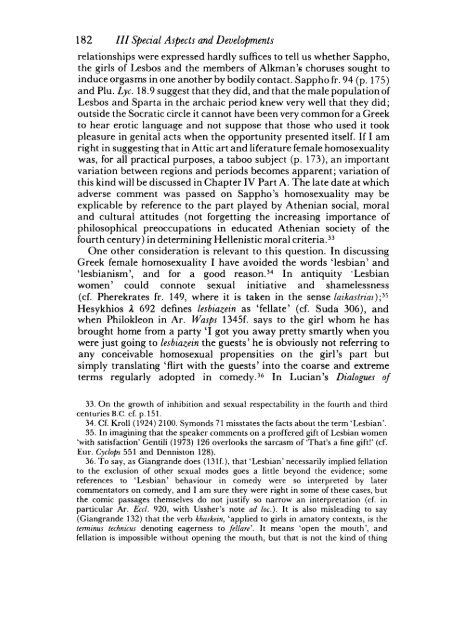GREEK HOMOSEXUALITY
k-_j-_dover_greek_homosexuality_updated_and_witbookfi-org
k-_j-_dover_greek_homosexuality_updated_and_witbookfi-org
- No tags were found...
Create successful ePaper yourself
Turn your PDF publications into a flip-book with our unique Google optimized e-Paper software.
182 Ill Special Aspects and Developments<br />
relationships were expressed hardly suffices to tell us whether Sappho,<br />
the girls of Lesbos and the members of Aikman's choruses sought to<br />
induce orgasms in one another by bodily contact. Sappho fr. 94 (p. 175)<br />
and Plu. Lye. 18.9 suggest that they did, and that the male population of<br />
Lesbos and Sparta in the archaic period knew very well that they did;<br />
outside the Socratic circle it cannot have been very common for a Greek<br />
to hear erotic language and not suppose that those who used it took<br />
pleasure in genital acts when the opportunity presented itself. If I am<br />
right in suggesting that in Attic art and literature female homosexuality<br />
was, for all practical purposes, a taboo subject (p. 173 ), an important<br />
variation between regions and periods becomes apparent; variation of<br />
this kind will be discussed in Chapter IV Part A. The late date at which<br />
adverse comment was passed on Sappho's homosexuality may be<br />
explicable by reference to the part played by Athenian social, moral<br />
and cultural attitudes (not forgetting the increasing importance of<br />
-philosophical preoccupations in educated Athenian society of the<br />
fourth century) in determining Hellenistic moral criteria. 33<br />
One other consideration is relevant to this question. In discussing<br />
Greek female homosexuality I have avoided the words 'lesbian' and<br />
'lesbianism', and for a good reason. 34 In antiquity ·Lesbian<br />
women' could connote sexual initiative and shamelessness<br />
( cf. Pherekrates fr. 149, where it is taken in the sense laikastriaz) ; 35<br />
Hesykhios A. 692 defines lesbiazein as 'fellate' (cf. Suda 306), and<br />
when Philokleon in Ar. Wasps 1345f. says to the girl whom he has<br />
brought home from a party 'I got you away pretty smartly when you<br />
were just going to lesbiazein the guests' he is obviously not referring to<br />
any conceivable homosexual propensities on the girl's part but<br />
simply translating 'flirt with the guests' into the coarse and extreme<br />
terms regularly adopted in comedy. 36 In Lucian's Dialogues of<br />
33. On the growth of inhibition and sexual respectability in the fourth and third<br />
centuries B.C. cf. p.151.<br />
34. Cf. Kroll (1924) 2100. Symonds 71 misstates the facts about the term 'Lesbian'.<br />
35. In imagining that the speaker comments on a proffered gift of Lesbian women<br />
'with satisfaction' Gentili (1973) 126 overlooks the sarcasm of 'That's a fine gift!' (cf.<br />
Eur. Cyclops 551 and Denniston 128).<br />
36. To say, as Giangrande does (131f.), that 'Lesbian' necessarily implied fellation<br />
to the exclusion of other sexual modes goes a little beyond the evidence; some<br />
references to 'Lesbian' behaviour in comedy were so interpreted by later<br />
commentators on comedy, and I am sure they were right in some of these cases, but<br />
the comic passages themselves do not justify so narrow an interpretation (cf. in<br />
particular Ar. Accl. 920, with Ussher's note ad loc.). It is also misleading to say<br />
(Giangrande 132) that the verb khaskein, 'applied to girls in amatory contexts, is the<br />
tenninus technicus denoting eagerness to fellare'. It means ~open the mouth', and<br />
fellation is impossible without opening the mouth, but that is not the kind of thing


